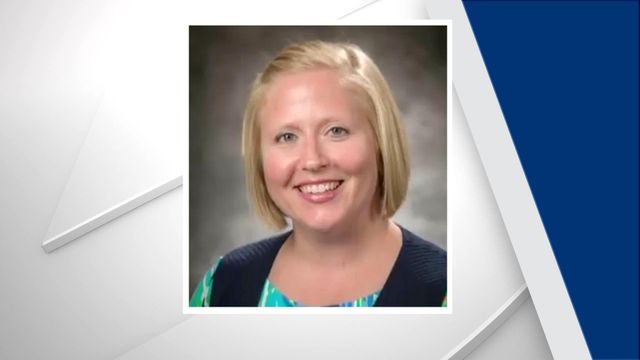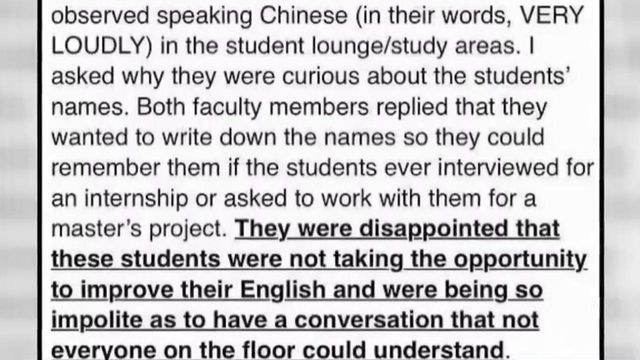Duke professor apologizes for English-only email to Chinese grad students
Duke University is investigating after a professor sent an email to Chinese graduate students Friday urging them to speak English on campus.
Posted — UpdatedAssistant Professor Megan Neely stepped down as director of graduate studies in the Department of Biostatistics and Bioinformatics over the weekend amid backlash over the email.
According to Neely's email, two faculty members went to her office Friday and asked her about a small group of first-year students who they observed speaking Mandarin "in their words, very loudly" in the student lounge areas. The faculty members told Neely they wanted the students' names so that, "if the students ever interviewed for an internship or asked to work with them for a master's project," they could remember them.
"They were disappointed that these students were not taking the opportunity to improve their English and were being so impolite as to have a conversation that not everyone on the floor could understand," the email read. "To international students, PLEASE PLEASE PLEASE keep those unintended consequences in mind when you choose to speak Chinese in the building. I have no idea how hard it has been and still is for you to come to the US and have to learn in a non-native language. As such, I have the upmost [sic] respect for what you are doing. That being said, I encourage you to commit to using English 100% of the time when you are in Hock or any other professional setting."
The email was sent to 54 students in the master's degree in biostatistics program, said Michael Schoenfeld, Duke's vice president for public affairs and government relations, and the university's Office of Institutional Equity is reviewing the program "to ensure that the learning environment there is one that is accepting, inclusive, and open for students of all backgrounds and cultures."
On Saturday, she apologized via email: "I deeply regret the hurt my email has caused. It was not my intention. Moving forward, it is my sincerest wish that every student in the Master of Biostatistics program is successful in all of their endeavors."
Neely sent a similar email last February urging foreign-born students to speak English. Schoenfeld said university administrators weren't aware of that email until recently.
"Duke does not have a language policy," Schoenfeld said. "In no way should or will any student have their career opportunities or references or anything like that compromised because of the language that they speak outside of the classroom. We have apologized to the students who received that message – for even the fact that it took place."
Kaiyang Xu, a graduate student in Duke's Department of East Asian Studies, said she and her fellow native Chinese students were hurt by the email's tone.
"I feel that is racial discrimination and cultural imperialism," said Xu, who helped draft a petition calling on Duke to investigate “discriminatory emails.”
"No one can deprive our right to speak our mother tongue. That is not a professional setting, that is just a private conversation," she said. "We respect English-speaking environments and English-spoken teaching environments. We will definitely speak English in classes and in laboratory and anywhere professional. But in private conversation, we definitely have the free will and right to speak whatever we want to speak."
The Duke Asian Students Association released a statement about the email, saying, "Duke has a responsibility to recognize academic cultures that are xenophobic and prejudiced, forcefully call the racism for what it is and take decisive action to change it."
Others at Duke were similarly appalled by the email and the negative light it has cast on the university.
"This is not what Duke is supposed to represent, and it sends out a very bad message," said Kathleen Boudreau, who works at Duke University Hospital. "I am totally mystified why someone from Duke would send out an email like that. [It's] very disappointing."
"You come to a high-quality university like Duke, and you’re surrounded by a huge number of international students. You can’t go 20 minutes without hearing another language," said Brian Allen, a doctoral student in mechanical engineering. "Most of my friends are Chinese, and they speak Mandarin, and they teach me Mandarin all the time. I think it’s become a good part of the university."
Duke has 175 undergraduates and more than 1,300 graduate students from China, Schoenfeld said. The university also has a campus in China, Duke Kunshan University.
"Duke is a place that values diversity, that values inclusion, that values culture, that values language, and [it] will continue to be the place that students came to when they aspired to come to Duke," he said. "This particular message and this particular incident was clearly unacceptable. It is our hope and goal and aspiration that it won’t happen again."
• Credits
Copyright 2024 by Capitol Broadcasting Company. All rights reserved. This material may not be published, broadcast, rewritten or redistributed.






